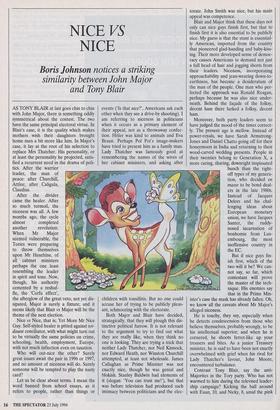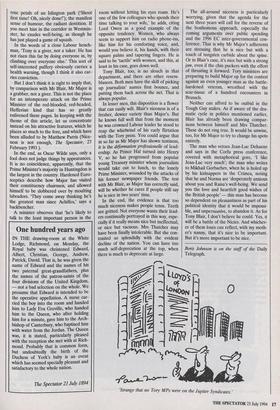NICE VS
NICE
Boris Johnson notices a striking
similarity between John Major and Tony Blair
AS TONY BLAIR at last goes chin to chin with John Major, there is something oddly symmetrical about the contest. The two have the same principal electoral virtue. In Blair's case, it is the quality which makes mothers wish their daughters brought home men a bit more like him. In Major's case, it lay at the root of his selection to replace Mrs Thatcher. His personality, or at least the personality he projected, satis- fied a recurrent need in the drama of poli- tics. After the warrior leader, the man of peace: after Churchill, Attlee; after Caligula, Claudius.
After the divider came the healer. After so much turmoil, the niceness was all. A few months ago, the cycle almost completed another revolution.
When Mr Major seemed vulnerable, the Tories were preparing to throw themselves upon Mr Heseltine, of all cabinet ministers perhaps the one least resembling the leader in spirit and tone. Now, though, his authority cemented by a reshuf- fle, the 'Corfu effect', the afterglow of the great veto, not yet dis- sipated, Major is surely a fixture; and it seems likely that Blair vs Major will be the theme of the next election.
Nice vs Nice, that is; Yet More Mr Nice Guy. Self-styled healer is pitted against soi- disant conciliator, with what might turn out to be virtually the same policies on crime, schooling, health, employment, Europe, with not much inflection even on taxation.
Who will out-nice the other? Surely great issues await the pair in 1996 or 1997, and no amount of niceness will do. Surely someone will be tempted to play the nasty card?
Let us be clear about terms. I mean the word banned from school essays, as it refers to people, rather than things or events (Is that nice?', Americans ask each other when they see a drive-by shooting). I am referring to niceness in politicians when it occurs as a primary element of their appeal, not as a throwaway confec- tion. Hitler was kind to animals and Eva Braun. Perhaps Poi Pot's image-makers have tried to present him as a family man. Lady Thatcher was famously good at remembering the names of the wives of her cabinet ministers, and asking after children with tonsillitis. But no one could accuse her of trying to be publicly pleas- ant, schmoozing with the electorate.
Both Major and Blair have decided, strategically, that they will plough this dis- tinctive political furrow. It is not relevant to the argument to try to find out what they are really like, when they think no one is looking. They are trying a trick that neither Lady Thatcher, nor Neil Kinnock, nor Edward Heath, nor Winston Churchill attempted, at least not wholesale. James Callaghan as Prime Minister was not exactly nice, though he was genial and blokish. Stanley Baldwin had elements of it (slogan: 'You can trust me!'), but that was before television had produced such intimacy between politicians and the elec- torate. John Smith was nice, but his main appeal was competence.
Blair and Major think that these days not only can nice guys finish first, but that to finish first it is also essential to be publicly nice. My guess is that the stunt is essential- ly American, imported from the country that pioneered glad-handing and baby-kiss- ing. Their more developed sense of democ- racy causes Americans to demand not just a full head of hair and jogging shorts from their leaders. Niceness, incorporating approachability and jean-wearing down-to- earthness, has become a desideratum of the man of the people. One man who per- fected the approach was Ronald Reagan, perhaps because he was also nice under- neath. Behind the façade of the folksy, decent ham there lurked a folksy, decent ham.
He is touchy, they say, especially when he detects condescension from those who believe themselves, probably wrongly, to be his intellectual superior; and when he is cornered, he shoots ferret-like up your trousers and bites. As a junior Treasury minister, he is said to have been not exactly overwhelmed with grief when his rival for Lady Thatcher's favour, John Moore, encountered turbulence.
Contrast Tony Blair, say the anti- Majorites in the Tory party. Who has not warmed to him during the televised leader- ship campaign? Kicking the ball around with Euan, 10, and Nicky, 8, amid the pink rose petals of an Islington park ('Shoot first time! Oh, nicely done'); the manifest sense of humour, the radiant dentition. If you meet him in the corridor in Westmin- ster, he exudes well-being, as though he has just played a game of squash.
In the words of a close Labour hench- man, 'Tony is a giver, not a taker. He has not risen this far by doing everyone in, by climbing over everyone else.' This sort of self-interested puffery obviously carries a health warning, though I think it also car- ries conviction.
But I don't think it is right to imply that, by comparison with Mr Blair, Mr Major is a grabber, not a giver. This is not the place for an intemperate attack on the Prime Minister of the red-blooded, red-headed, Hefferian kind that has so greatly enlivened these pages. In keeping with the theme of this article, let us concentrate instead on his attractive features, which he places so much to the fore, and which have been alluded to by Matthew Parris (Nice- ness is not enough, The Spectator, 27 February 1993).
In the end, as Oscar Wilde says, only a fool does not judge things by appearances. It is no coincidence, apparently, that the Prime Minister's majority in Huntingdon is the largest in the country. Hardened Euro- sceptics describe how Major has visited their constituency chairmen, and allowed himself to be slobbered over by moulting labradors. 'They come away thinking he's the greatest man since Achilles,' says a backbencher.
A minister observes that 'he's likely to talk to the least important person in the room without letting his eyes roam. He's one of the few colleagues who spends their time talking to your wife,' he adds, citing Lord Owen as a good example of the opposite tendency. Women, who always seem to support him on radio phone-ins, like him for his comforting voice, and, would you believe it, his hands, with their square palms and tapering fingers. He is said to be 'tactile' with women, and this, at least in his case, goes down well.
Tony Blair, too, is no slouch in that department, and there are other resem- blances. Both men have the skill of picking up journalists' names first bounce, and patting them back across the net. That is always popular. In lesser men, this disposition is a flower that can easily wilt. Blair's niceness is of a fresher, dewier variety than Major's. But he knows full well that from the moment he was crowned Labour leader he stood to reap the whirlwind of his early flirtation with the Tory press. You could argue that in so far as Mr Major has shown testiness, it is the deformation professionelk of lead- ership. As Prince Hal turned into Henry V, so he has progressed from popular young Treasury minister whom journalists would take out to lunch, to the lonely Prime Minister, wounded by the attacks of his former newspaper friends. The test with Mr Blair, as Major has correctly said, will be whether he cares if people still say he is nice in two years' time.
In the end, the evidence is that too much niceness makes people tense. Teeth are gritted. Not everyone wants their lead- ers continually portrayed in this way, espe- cially if it really means nice but ineffectual, or nice but vacuous. Mrs Thatcher may have been finally intolerable. But she con- trasted so splendidly with the evident decline of the nation. You can have too much self-deprecation at the top, when there is much to deprecate at large. The all-around niceness is particularly worrying, given that the agenda for the next three years will call for the reverse of the bonhomous approach, especially the coming arguments over public spending and the 1996 EC inter-governmental con- ference. That is why Mr Major's adherents are stressing that he is nice but with a touch of tungsten carbide about the spine. Or in Blair's case, it's nice but with a strong jaw, even if the chin puckers with the effort of thrusting it forward. Tory ministers are preparing to build Major up for the contest against an even younger man as the battle- hardened veteran, wreathed with the scar-tissue of a hundred encounters in Brussels.
Neither can afford to be outbid in the Tough Guy stakes. As if aware of the dra- matic cycle in politics mentioned earlier, Blair has already been drawing compar- isons between himself and Mrs Thatcher. These do not ring true. It would be unwise, too, for Mr Major to try to change his spots entirely.
The man who vetoes Jean-Luc Dehaene and says in the Corfu press conference, covered with metaphorical gore, 'I like Jean-Luc very much'; the man who writes to Mikhail Gorbachev, when he is holed up by his kidnappers in the Crimea, noting that he and Norma are 'desperately anxious about you and Raisa's well-being. We send you the love and heartfelt good wishes of the British people' — this man has become so dependent on pleasantness as part of his political identity that it would be impossi- ble, and unpersuasive, to abandon it. As for Tony Blair, I don't believe he could. Yes, it will be a battle of the Nicies. And whichev- er of them loses can reflect, with my moth- er's nanny, that it's nice to be important. But it's more important to be nice.
Bons Johnson is on the staff of the Daily Telegraph.
'Strange that no Tory MPs were on the Jupiter Syndicates.'



















































 Previous page
Previous page